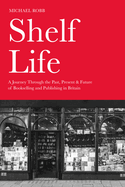
Pure catnip for booksellers and bibliophiles, Shelf Life by Michael Robb is a warm, meticulously researched history of books, bookselling, and publishing, packed with fascinating detail, surprising facts, and the author's love of the trade. Although Robb's focus is on the evolution of bookselling and publishing in Great Britain, the history of the book trade is global.
Though the written word has existed for millennia, Robb's history really gets going with William Caxton, the English merchant who introduced the printing press to England in 1476 and subsequently became the first retailer of books in the English language. As every bookseller knows, however, the one constant when it comes to the trade is change. Robb, who owned an independent bookstore in England for many years, charts these seismic shifts through key figures and events. For example, he introduces James Lackington, who was so eager to share his love of books that he discounted their price and, in 1793, opened London's the Temple of the Muses bookstore, which stocked more than a million books. Allen Lane's 1930 introduction of inexpensive Penguin paperbacks also changed publishing, allowing millions of readers access to classic works.
Robb describes the rise of chain bookstores and how they affected independent booksellers (his own bookstore was a victim of this development), how Amazon rocked the industry, and, finally, offers a look forward as the proliferation of artificial intelligence and the decline in childhood reading threaten the existence of the trade in the 21st century. Nonetheless, Shelf Life ends on a positive note--that those who love books will continue to share them and get them into the hands of readers. --Debra Ginsberg, author and freelance editor

